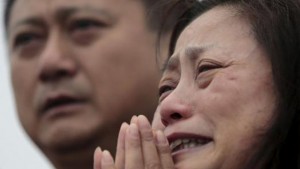 Police were not immediately available for comment.
Police were not immediately available for comment.
The Eastern Star cruise ship capsized in a storm on Monday night with 456 people on board. Only 14 survivors have been found while authorities have recovered 75 dead bodies. More than 300 people are still missing and it could be the country’s worst maritime disaster in nearly 70 years.
China’s government often seeks to control information in the wake of high-profile disasters, concerned about challenges to its authority and hypersensitive about its image.
But the Eastern Star disaster also has coincided with the most sensitive day on China’s calendar, the June 4 anniversary of the bloody 1989 crackdown on pro-democracy protests around Tiananmen Square.
The family members have been growing increasingly impatient with the government, saying they have received few answers to questions about their loved ones on board the ship.
Some family members took matters into their own hands on Wednesday and hired a bus to take them from Nanjing city, where the cruise originated, to Jianli county in central Hubei province where the ship capsized.
When they arrived in Jianli they tried to walk to the site of rescue operations, but were stopped by police who had accompanied them from Nanjing. Authorities later said they could visit the area in organized groups but reporters and cameramen could not accompany them.
“I can’t rule out that even among Chinese journalists there are people who want to smear the government,” Hu Shining, Nanjing’s deputy police chief, told the relatives who had walked with reporters in tow to try to get to the river’s edge.
